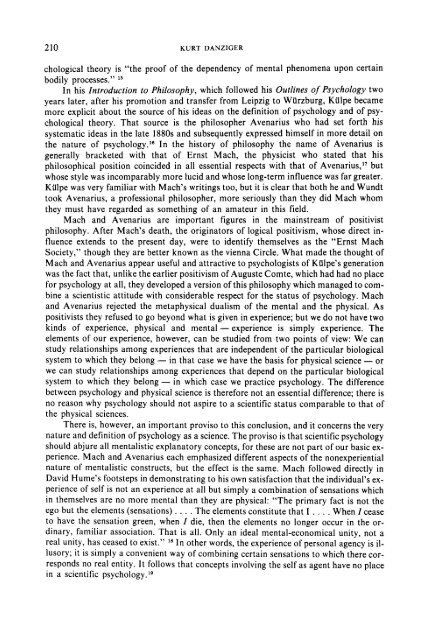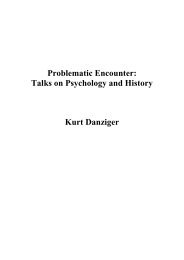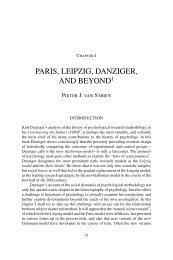The positivist repudiation of Wundt - Kurt Danziger
The positivist repudiation of Wundt - Kurt Danziger
The positivist repudiation of Wundt - Kurt Danziger
You also want an ePaper? Increase the reach of your titles
YUMPU automatically turns print PDFs into web optimized ePapers that Google loves.
210 KURT DANZlGER<br />
chological theory is “the pro<strong>of</strong> <strong>of</strong> the dependency <strong>of</strong> mental phenomena upon certain<br />
bodily processes.” l5<br />
In his Introduction to Philosophy, which followed his Outlines <strong>of</strong> Psychology two<br />
years later, after his promotion and transfer from Leipzig to Wiirzburg, Kiilpe became<br />
more explicit about the source <strong>of</strong> his ideas on the definition <strong>of</strong> psychology and <strong>of</strong> psy-<br />
chological theory. That source is the philosopher Avenarius who had set forth his<br />
systematic ideas in the late 1880s and subsequently expressed himself in more detail on<br />
the nature <strong>of</strong> psychology.16 In the history <strong>of</strong> philosophy the name <strong>of</strong> Avenarius is<br />
generally bracketed with that <strong>of</strong> Ernst Mach, the physicist who stated that his<br />
philosophical position coincided in all essential respects with that <strong>of</strong> Avenarius,” but<br />
whose style was incomparably more lucid and whose long-term influence was far greater.<br />
Kiilpe was very familiar with Mach’s writings too, but it is clear that both he and <strong>Wundt</strong><br />
took Avenarius, a pr<strong>of</strong>essional philosopher, more seriously than they did Mach whom<br />
they must have regarded as something <strong>of</strong> an amateur in this field.<br />
Mach and Avenarius are important figures in the mainstream <strong>of</strong> <strong>positivist</strong><br />
philosophy. After Mach’s death, the originators <strong>of</strong> logical positivism, whose direct in-<br />
fluence extends to the present day, were to identify themselves as the “Ernst Mach<br />
Society,” though they are better known as the Vienna Circle. What made the thought <strong>of</strong><br />
Mach and Avenarius appear useful and attractive to psychologists <strong>of</strong> Kiilpe’s generation<br />
was the fact that, unlike the earlier positivism <strong>of</strong> Auguste Comte, which had had no place<br />
for psychology at all, they developed a version <strong>of</strong> this philosophy which managed to com-<br />
bine a scientistic attitude with considerable respect for the status <strong>of</strong> psychology. Mach<br />
and Avenarius rejected the metaphysical dualism <strong>of</strong> the mental and the physical. As<br />
<strong>positivist</strong>s they refused to go beyond what is given in experience; but we do not have two<br />
kinds <strong>of</strong> experience, physical and mental - experience is simply experience. <strong>The</strong><br />
elements <strong>of</strong> our experience, however, can be studied from two points <strong>of</strong> view: We can<br />
study relationships among experiences that are independent <strong>of</strong> the particular biological<br />
system to which they belong - in that case we have the basis for physical science - or<br />
we can study relationships among experiences that depend on the particular biological<br />
system to which they belong - in which case we practice psychology. <strong>The</strong> difference<br />
between psychology and physical science is therefore not an essential difference; there is<br />
no reason why psychology should not aspire to a scientific status comparable to that <strong>of</strong><br />
the physical sciences.<br />
<strong>The</strong>re is, however, an important proviso to this conclusion, and it concerns the very<br />
nature and definition <strong>of</strong> psychology as a science. <strong>The</strong> proviso is that scientific psychology<br />
should abjure all mentalistic explanatory concepts, for these are not part <strong>of</strong> our basic ex-<br />
perience. Mach and Avenarius each emphasized different aspects <strong>of</strong> the nonexperiential<br />
nature <strong>of</strong> mentalistic constructs, but the effect is the same. Mach followed directly in<br />
David Hume’s footsteps in demonstrating to his own satisfaction that the individual’s ex-<br />
perience <strong>of</strong> self is not an experience at all but simply a combination <strong>of</strong> sensations which<br />
in themselves are no more mental than they are physical: “<strong>The</strong> primary fact is not the<br />
ego but the elements (sensations) . . . . <strong>The</strong> elements constitute that I . . . . When I cease<br />
to have the sensation green, when I die, then the elements no longer occur in the or-<br />
dinary, familiar association. That is all. Only an ideal mental-economical unity, not a<br />
real unity, has ceased to exist.” l8 In other words, the experience <strong>of</strong> personal agency is il-<br />
lusory; it is simply a convenient way <strong>of</strong> combining certain sensations to which there cor-<br />
responds no real entity. It follows that concepts involving the self as agent have no place<br />
in a scientific psychol~gy.~~





